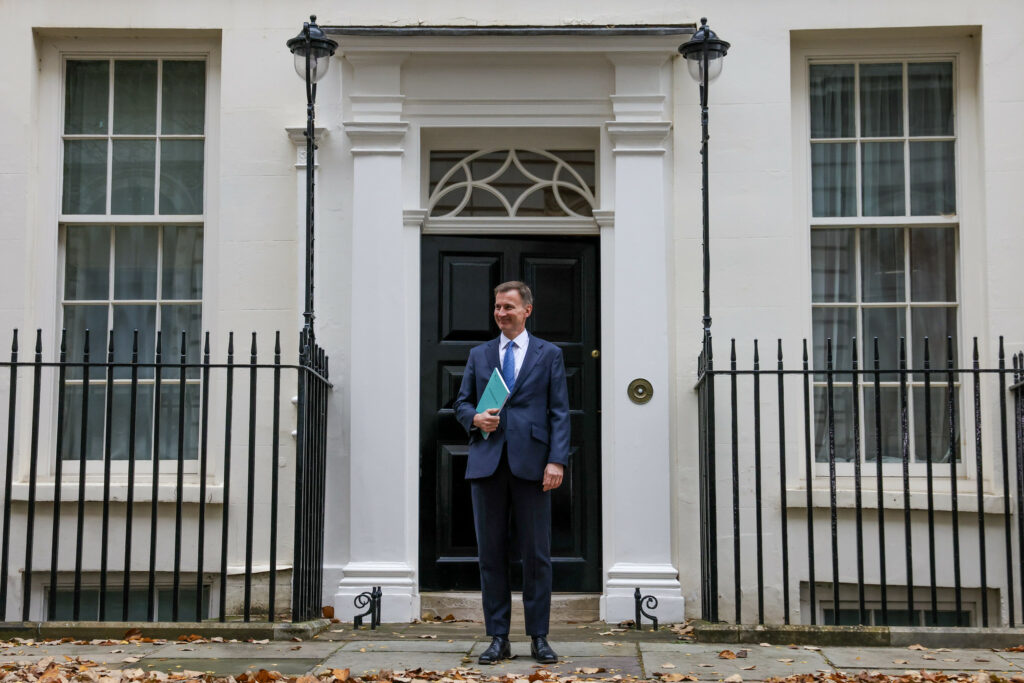Lydia Godden, the IWA’s Economic Policy and Research Officer, takes a closer look at the Autumn Statement 2023 and its likely impact on the lives of people in Wales.
Last week the Chancellor, Jeremy Hunt, delivered his Autumn Statement and announced tax cuts at the cost of cuts to public service delivery. The statement represents another missed opportunity to do what is required to tackle ongoing inflation and the cost of living crisis. With worrying echoes of a return to austerity, little in the way of support to those most in need, and a worrying shift in tougher punitive benefits sanctions, the Autumn Statement appears to be a pre-election tactic that delivers little for the people of Wales.
So what are the key takeaways of the Autumn Statement? The Chancellor announced a 2% reduction in the rate of National Insurance; tax cuts for private industry; a new Investment Zone in North East Wales; and extended tax relief for freeports. Certain benefits including universal credit will rise in line with inflation by 6.7%, the freeze on Local Housing Allowance will be lifted and the statutory National Living Wage will rise to £11.44. However, such measures will only come into effect in April 2024.
Overall, the headline message has been of cutting taxes. However, the Resolution Foundation has labelled this a ‘tax paradox’: a rhetoric of tax cutting when tax will in fact be rising. Put simply, this is because the UK Government’s £20 billion of Autumn Statement tax cuts comes after roughly £90 billion of tax rises have already been announced during this Parliament.
Such cuts to taxes have been funded by real terms cuts to public spending, a political decision that will drastically impact public service delivery in Wales. When facing the Autumn Statement, the Chancellor had a £27 billion net fiscal windfall. There was an opportunity to retain this and allow headroom to increase or fund creaking public services, but this Autumn Statement squarely rejects that opportunity. Instead, the windfall is being used to fund tax cuts that overwhelmingly benefit higher earners – a decision at odds with the reality of Wales’ needs.
While tax cuts will have relatively little impact upon those struggling, looming cuts to public services in Wales will have a drastic impact, felt most acutely by the most vulnerable in society.
The accompanying forecast from the Office for Budget Responsibility (OBR) illustrates that the Autumn Statement delivers little impact on the cost of living crisis and has worsened the growth rates. The OBR is now less optimistic, downgrading the estimate for medium-term potential growth rate to 1.6% a year from 1.8%. Inflation is here to stay for longer than expected. Meanwhile, the OBR forecast that living standards will be 3.5% lower in 2024 than prior to the pandemic, marking the largest fall in living standards since records began.
How will the Chancellor’s Autumn Statement impact Wales?
Broadly speaking, the announcement of a new Investment Zone and extended tax relief for Freeports can be seen by some as a welcome investment in the future of Wales’ economy. Investment zones establish knowledge-intensive clusters while Freeports offer a range of tax and regulatory incentives both aimed at driving economic growth. However, this cautious welcome comes with significant caveats as previous initiatives to create similar zones have struggled to meet the targets set for them and stimulate growth. For such incentives to succeed they must be delivered alongside long-term planning and – crucially – adequate funding.
On tax cuts, the UK Government has stated that the cut to National Insurance will make 1.2 million workers in Wales £324 better off each year. As previously stated, this is at odds with a more holistic view of the reality of tax rises and does nothing to recompense working people for the increases in income tax due to freezing thresholds. Furthermore, such tax cuts will primarily benefit those most well off, and will have a limited impact on the majority of Welsh households. Analysis by the New Economics Foundation (NEF) has found the poorest quarter of households in the UK will be £210 per week short of an acceptable standard of living by April 2024. As the poorest region of the UK, this will be particularly felt in communities and homes across Wales.
While tax cuts will have relatively little impact upon those struggling, looming cuts to public services in Wales will have a drastic impact, felt most acutely by the most vulnerable in society. Public services in Wales are currently under significant strain with pressures across the NHS, social care and education. Prior to the Autumn Statement a number of local authorities in Wales had signalled they may be facing bankruptcy without immediate investment and would then have no choice but to cut Council budgets in order to survive. The Chancellor’s failure to acknowledge such pressures means real term cuts that will significantly undermine public service delivery across Wales.
Syniadau uchelgeisiol, awdurdodol a mentrus.
Ymunwch â ni i gyfrannu at wneud Cymru gwell.
What’s more, the Autumn Statement brings familiar echoes of a return to the Osbourne/Cameron led era of austerity that had a crippling effect on the economy of Wales. Cuts to public services, a fall in living standards, real terms cuts to household earnings and tax cuts for higher earners in society: we have been here before. These decisions are inherently political in nature and are not in the interest of creating a strong economy. Instead they will starve public services, limit economic growth and lead to job losses.
This Autumn Statement signals short-term, pre-election decision-making to improve the Conservatives’ poll positions ahead of the coming general election. The long-term economic fallout of overspending now means even more public spending cuts will become a grim reality for the next government, which polls suggest will be Labour.
What can Welsh Government do?
A significant challenge lies ahead for the Welsh Government at a time described as the ‘toughest’ financial position since devolution, having already made £600 million in budget cuts in October 2023. With a budget determined by decisions made in Westminster and limited fiscal firepower, the Autumn Statement further limits the Welsh Government’s ability to lessen the impacts of these decisions on local authorities and public spending in Wales.
Our view is that such decisions have a negative impact on future, long-term economic growth and do not enable Wales to achieve a stronger, fairer and greener economy. Well funded and resourced public services are key to securing economic growth, contributing to productivity, macro-economic stability and lowering inequality.
On the broader ‘benefits’ delivered by the Chancellor, while many will welcome the uplift in benefits, these changes, along with the increase in the living wage, only come into effect in April 2024. This means a very difficult winter lies ahead for many in Wales who will be experiencing a real-terms cut to their universal credit or disability benefits until April next year. Coupled with a focus on increasing the use of punitive sanctions such as removing benefits payments in order to force long term sick and disabled people into potentially unsuitable jobs, this Autumn Statement ramps up the already hostile environment of welfare benefits administration.
The Chancellor announced a tougher regime of workplace capability assessments, a process already seen as particularly dehumanising, with thousands of those deemed ‘fit for work’ having died following assessments. The current system makes people sicker and puts added strain on the NHS. Given that a significant portion (21%) of Wales’ population are disabled (in comparison with England’s 17%), with a significant number of people suffering long-term sickness, this policy will have a significant negative impact in Wales. Wales has one of the highest proportions of the population claiming disability benefits, with Blaenau Gwent, Neath Port Talbot and Merthyr Tydfil local authorities having the highest disability benefit caseloads of the UK. Punishing individuals and their families by potentially plunging them deeper into poverty is morally wrong and fiscally redundant given the wider knock-on financial impacts upon health and public services in Wales. It is a cruel policy based on judgement rather than evidence and will have lethal consequences.
For Wales to achieve a strong, sustainable and fair economy we need to see long-term planning and investment in public service delivery. Admittedly, tough decisions lie ahead for all governments across the UK, however, yet again short-term thinking and political choices from the UK Government limit the Welsh Government’s ability to enable the structural and transformative change needed in the economy. Wales urgently needs bold leadership that considers everyday people at the heart of decision making but we are instead being offered what appears to be a return to the widely discredited policies of austerity.
All articles published on the welsh agenda are subject to IWA’s disclaimer. If you want to support our work tackling Wales’ key challenges, consider becoming a member.





